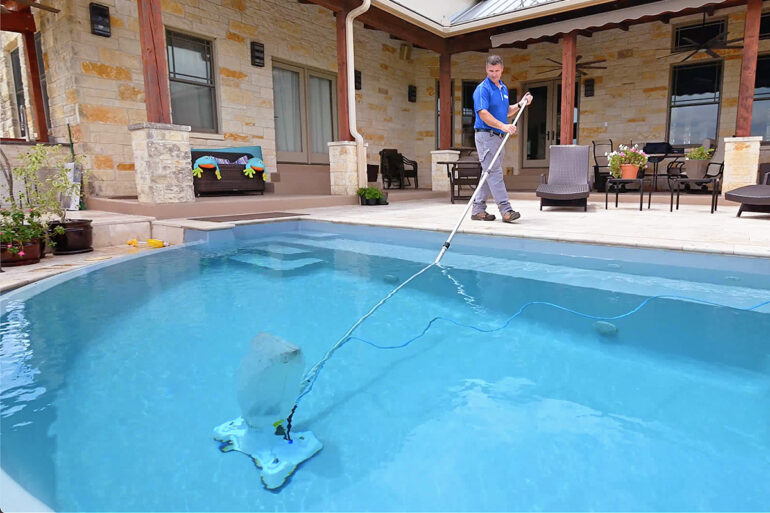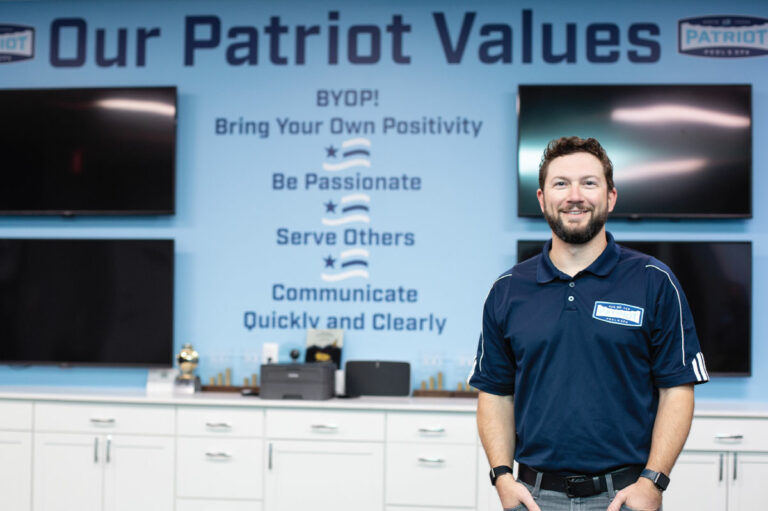Safety First

A technician’s life can change in the few seconds it takes to enter a customer’s backyard for a pool service. It’s something David Hawes, owner of H & H Pool Services in Dublin, California, knows from an unfortunate experience.
In 2014, one of Hawes’ pool techs entered a yard where two dogs attacked her. Hawes says the dogs weren’t supposed to be there and “literally mauled” his employee.
“It took several months for her to recover from her injuries,” he recalls. “That’s not even to [speak of] the mental trauma. She recovered but never came back to work because of her inability to go in any backyard that had dogs.”
Fortunately, he had workers’ compensation insurance — as required by the state of California — to cover his employee’s lost wages and medical bills as she began her recovery.
The role of workers’ comp
Workers’ compensation assists people injured while working or who experience a work-related illness. It also includes medical treatment for work-related conditions and cash payments to partially replace lost wages, according to the Social Security Office of Policy. Additionally, workers’ comp insurance may include disability benefits like temporary or permanent disability, total disability and death benefits (for dependents if the employee passes away due to a jobsite accident).
Workers’ compensation programs vary on who can provide insurance, which injuries or illnesses are compensable and the benefits levels.
Amputations are the most costly type of injury in workers’ compensation claims, according to the National Safety Council, which can occur due to aggressive backyard dogs, machinery, car crashes and other job hazards.
Liability concerns and legal requirements
“Liability-wise, there are so many things that can happen [on the job],” says Danielle Bahr, owner of Swimming Pool Pro Alliance and Bahr Insurance Agency in California. Already having medical insurance — or the homeowner’s insurance policy — are a few of the objections she hears from pool business owners about adding on the costly workers’ comp.
“That’s great [to have individual medical insurance] but if something happens, [medical professionals are] going to ask, ‘Where did this happen?’ ” Bahr says. “People have workers’ compensation to protect them in the event an employee is hurt.”
Medical providers ask these questions because health insurance policies typically do not cover on-the-job injuries, and even if the doctor doesn’t ask, the health insurance company certainly will once a claim is filed. Work-related injuries should be submitted under the employer’s workers’ comp policy.
Generally, state laws require employers to carry workers’ compensation insurance or prove they can financially self-insure in the event of a major employee illness or injury, according to the Social Security Office of Policy. It’s important to note that certain states — Washington, North Dakota, Ohio and Wyoming — have state-run workers’ comp, where coverage is provided by the government instead of a private insurance company. Only two states, Texas and South Dakota, do not require employers to carry workers’ comp.
Hawes insists workers’ comp insurance is a must for pool pros. Even if his state didn’t mandate it, he says he’d still carry it because he cares about his employees and company — plus, accidents do happen.
“You have to have it,” he says. “I don’t ever want to be in a situation where somebody loses their income and they look at me and go, ‘What were you thinking [not having coverage]?’ ”
Choosing the right option
Carrying the right coverage through a top-rated insurer matters too.
Travelers, The Hartford and AmTrust Financial are some of the larger workers’ compensation insurance companies. Getting multiple quotes will offer options to choose from, Bahr says. Often, compensation rates are based on guidance from the National Council on Compensation Insurance, which also has a classification code that determines pool industry risk factors.
Hawes advises pool pros to go with someone they already trust to make the process easier. His provider is IWC Group out of San Diego. A top-notch agency will also send regular workplace safety training resources to their insured clients, says Hawes, who gets weekly emails from his insurance company.
“Not everybody brokers workers’ compensation, but you should talk to your insurance agent first,” he says. “Talk to a broker you’re already working with for auto insurance, liability insurance, etc., and see if they can help you.”
The responsibility of business owners
For pool pros living in a state that doesn’t require workers’ comp insurance, experts recommend still having it — even if it’s for a single employee.
Hawes recalls a story of a California pool service company trying to skirt payroll taxes and workers comp expenses by saying his technicians were 1099 contractors instead of employees. A technician put his foot through a skimmer and broke his leg. When the injured worker tried to file unemployment, they unfortunately discovered there wasn’t a way to collect unemployment or workers’ compensation.
As a result of both infractions, the employer was slapped with a six-figure fine.
“In the pool business, there are a lot of folks flirting with danger,” Hawes says of those skipping workers’ compensation insurance. “This is one expense you best just put into the budget so your employees are covered.”
Not surprisingly, both service and installation and maintenance and repair are in the top five private industries with the largest number of work-related injuries and illnesses, according to the Insurance Information Institute.
Ron Perkins, owner of Seven Seas Pools and Spas, sees it as a business expense that protects everyone — from the business owner to the homeowner but especially the employees.
“Any time that you do construction, or anytime you’re moving machinery around, there’s risk,” says Perkins, whose crew will put in around 130 pools this year. “The better you protect yourself, the better you protect your employees — and the longer your company is going to be able to sustain.”
He also sees it as the responsibility of a smart business owner to keep insurance active.
“It’s expensive [but] it’s needed,” he says. “It’s the right thing to not only protect yourself but to protect homeowners and your employees from any issues.”
Avoiding fraud
Bahr and Hawes have both experienced and heard about fraudulent activity in the insurance industry, too. That’s why they recommend researching an insurance company by asking about customer service methods and payout percentages. A reliable insurance company will fully investigate all claims to ensure accuracy, fairness and legitimacy.
Pool pros can also investigate through the Better Business Bureau to see if there are any open complaints against an insurance company.
Don’t cut corners. Educate yourself. Make sure you have the right insurance— it makes our industry better.”
Danielle Bahr, Swimming Pool Pro Alliance, Bahr Insurance Agency
“Don’t cut corners,” Bahr says. “Educate yourself. Make sure you have the right insurance — it makes our industry better.”






